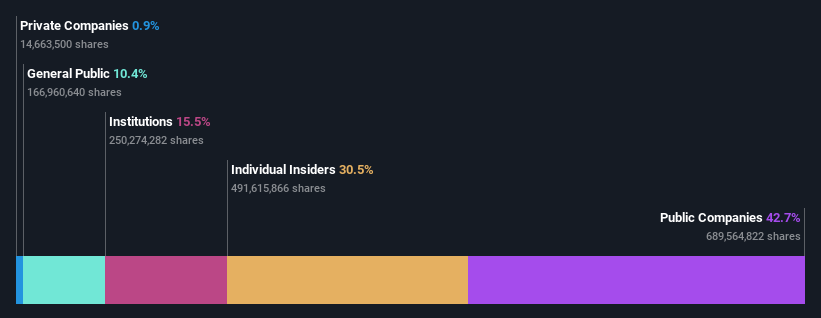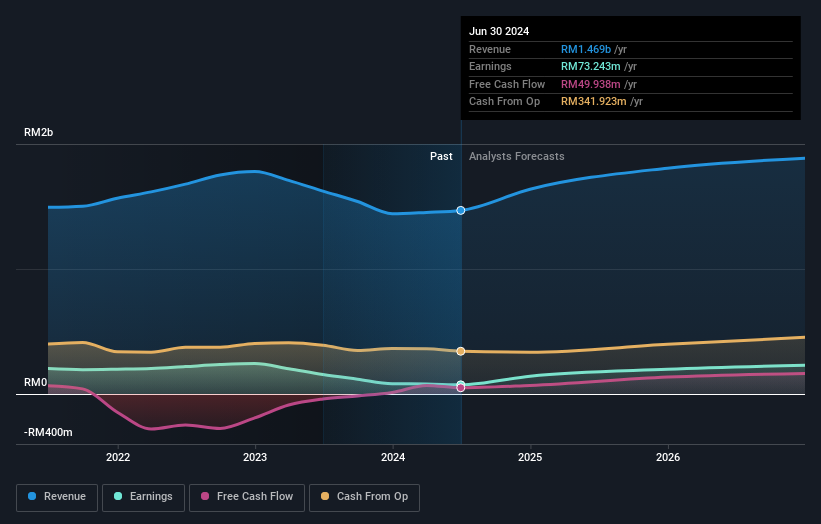- Malaysia
- /
- Semiconductors
- /
- KLSE:UNISEM
Public companies are Unisem (M) Berhad's (KLSE:UNISEM) biggest owners and were hit after market cap dropped RM258m

Key Insights
- The considerable ownership by public companies in Unisem (M) Berhad indicates that they collectively have a greater say in management and business strategy
- The top 2 shareholders own 71% of the company
- Insiders own 30% of Unisem (M) Berhad
To get a sense of who is truly in control of Unisem (M) Berhad (KLSE:UNISEM), it is important to understand the ownership structure of the business. We can see that public companies own the lion's share in the company with 43% ownership. That is, the group stands to benefit the most if the stock rises (or lose the most if there is a downturn).
While insiders who own 30% came under pressure after market cap dropped to RM4.8b last week,public companies took the most losses.
In the chart below, we zoom in on the different ownership groups of Unisem (M) Berhad.
View our latest analysis for Unisem (M) Berhad

What Does The Institutional Ownership Tell Us About Unisem (M) Berhad?
Institutions typically measure themselves against a benchmark when reporting to their own investors, so they often become more enthusiastic about a stock once it's included in a major index. We would expect most companies to have some institutions on the register, especially if they are growing.
As you can see, institutional investors have a fair amount of stake in Unisem (M) Berhad. This suggests some credibility amongst professional investors. But we can't rely on that fact alone since institutions make bad investments sometimes, just like everyone does. It is not uncommon to see a big share price drop if two large institutional investors try to sell out of a stock at the same time. So it is worth checking the past earnings trajectory of Unisem (M) Berhad, (below). Of course, keep in mind that there are other factors to consider, too.

Hedge funds don't have many shares in Unisem (M) Berhad. The company's largest shareholder is Tianshui Huatian Technology Co., Ltd., with ownership of 43%. For context, the second largest shareholder holds about 28% of the shares outstanding, followed by an ownership of 4.8% by the third-largest shareholder. Sin Chia, who is the second-largest shareholder, also happens to hold the title of Chief Executive Officer.
After doing some more digging, we found that the top 2 shareholders collectively control more than half of the company's shares, implying that they have considerable power to influence the company's decisions.
While it makes sense to study institutional ownership data for a company, it also makes sense to study analyst sentiments to know which way the wind is blowing. There are plenty of analysts covering the stock, so it might be worth seeing what they are forecasting, too.
Insider Ownership Of Unisem (M) Berhad
While the precise definition of an insider can be subjective, almost everyone considers board members to be insiders. The company management answer to the board and the latter should represent the interests of shareholders. Notably, sometimes top-level managers are on the board themselves.
Insider ownership is positive when it signals leadership are thinking like the true owners of the company. However, high insider ownership can also give immense power to a small group within the company. This can be negative in some circumstances.
Our information suggests that insiders maintain a significant holding in Unisem (M) Berhad. It is very interesting to see that insiders have a meaningful RM1.5b stake in this RM4.8b business. Most would say this shows a good degree of alignment with shareholders, especially in a company of this size. You can click here to see if those insiders have been buying or selling.
General Public Ownership
The general public-- including retail investors -- own 10% stake in the company, and hence can't easily be ignored. While this group can't necessarily call the shots, it can certainly have a real influence on how the company is run.
Public Company Ownership
It appears to us that public companies own 43% of Unisem (M) Berhad. It's hard to say for sure but this suggests they have entwined business interests. This might be a strategic stake, so it's worth watching this space for changes in ownership.
Next Steps:
I find it very interesting to look at who exactly owns a company. But to truly gain insight, we need to consider other information, too. Be aware that Unisem (M) Berhad is showing 2 warning signs in our investment analysis , and 1 of those shouldn't be ignored...
But ultimately it is the future, not the past, that will determine how well the owners of this business will do. Therefore we think it advisable to take a look at this free report showing whether analysts are predicting a brighter future.
NB: Figures in this article are calculated using data from the last twelve months, which refer to the 12-month period ending on the last date of the month the financial statement is dated. This may not be consistent with full year annual report figures.
New: AI Stock Screener & Alerts
Our new AI Stock Screener scans the market every day to uncover opportunities.
• Dividend Powerhouses (3%+ Yield)
• Undervalued Small Caps with Insider Buying
• High growth Tech and AI Companies
Or build your own from over 50 metrics.
Have feedback on this article? Concerned about the content? Get in touch with us directly. Alternatively, email editorial-team (at) simplywallst.com.
This article by Simply Wall St is general in nature. We provide commentary based on historical data and analyst forecasts only using an unbiased methodology and our articles are not intended to be financial advice. It does not constitute a recommendation to buy or sell any stock, and does not take account of your objectives, or your financial situation. We aim to bring you long-term focused analysis driven by fundamental data. Note that our analysis may not factor in the latest price-sensitive company announcements or qualitative material. Simply Wall St has no position in any stocks mentioned.
About KLSE:UNISEM
Unisem (M) Berhad
Provides semiconductor assembly and test services for electronic companies in Asia, Europe, and the United States.
Flawless balance sheet with reasonable growth potential.
Similar Companies
Market Insights
Community Narratives



